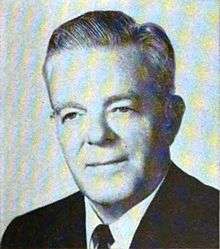Leo W. O'Brien
Leo William O'Brien (September 21, 1900 – May 4, 1982) was a Democratic member of the United States House of Representatives from New York.[1]
Leo W. O'Brien | |
|---|---|
 | |
| Member of the U.S. House of Representatives from New York's 32nd district | |
| In office April 1, 1952 – January 3, 1953 | |
| Preceded by | William T. Byrne |
| Succeeded by | Bernard W. Kearney |
| Member of the U.S. House of Representatives from New York's 30th district | |
| In office January 3, 1953 – January 3, 1963 | |
| Preceded by | J. Ernest Wharton |
| Succeeded by | Carleton J. King |
| Member of the U.S. House of Representatives from New York's 29th district | |
| In office January 3, 1963 – December 30, 1966 | |
| Preceded by | J. Ernest Wharton |
| Succeeded by | Daniel E. Button |
| Personal details | |
| Born | September 21, 1900 Buffalo, New York |
| Died | May 4, 1982 (aged 81) Albany, New York |
| Resting place | St. Agnes Cemetery, Menands, New York |
| Spouse(s) | Mabel C. Jean (m. 1925) |
| Children | 2 |
| Alma mater | Niagara University |
| Profession | Newspaper reporter Radio and television commentator |
Biography
Nicknamed "Obie," O'Brien was born in Buffalo, New York. He graduated from Niagara University in 1922. O'Brien worked as a newspaper journalist for the International News Service, and Albany Knickerbocker Press and Times-Union. He later became a radio and television commentator. From 1935 to 1952 he was a member of the Port of Albany District Commission.[1]
In 1952 he was the successful Democratic nominee for the United States House of Representatives seat left vacant by the death of William T. Byrne. He was reelected seven times and served from April 1, 1952 until resigning on December 30, 1966, a few days before the end of his final term. He was not a candidate for reelection in 1966 and returned to the Albany area.
As a member of the Committee on Interior and Insular Affairs, O'Brien was a leading advocate for Alaska and Hawaii statehood. In recognition of his efforts, in 1964 the State of Alaska named Mount Terrance, a mountain near Haines, Alaska after O'Brien's then 10-year-old grandson.[2]
He also helped create the Fire Island National Seashore, and strongly advocated cleanup of the Hudson River and protecting it as a scenic waterway.
After leaving Congress O'Brien served as Chairman of the Albany County Planning Board and the Adirondack Study Commission.
He died at St. Peter's Hospital in Albany, New York on May 4, 1982.[1] He was buried at St. Agnes Cemetery in Menands.[3]
Family
In 1925, O'Brien married to Mabel C. Jean. They were the parents of two children, Robert and Mary.[4]
Legacy
The United States federal building in Albany, New York is named after him. It is located at the corner of Clinton Avenue and North Pearl Street, and contains facilities including a Military Entrance Processing Station (MEPS).[5]
References
- Walter H. Waggoner (May 5, 1982). "Leo W. O'Brien, 81, is Dead; Former Albany Congressman". New York Times. Retrieved 2014-07-30.
- "Alaska Mountain Named". New York Times. New York, NY. July 15, 1964.
- Leo W. O'Brien at Find a Grave
- The New York Red Book. 65. Albany, NY: Williams Press. 1956. p. 893.
- "Albany Military Entrance Processing Station". MEPS Information. United States Military Entrance Processing Command. Retrieved November 2, 2015.
Further reading
- United States Congress. "Leo W. O'Brien (id: O000015)". Biographical Directory of the United States Congress.
- Leo W. O'Brien at Find a Grave
- Leo W. O'Brien at The Political Graveyard
- Associated Press, Toledo Blade, Death notice, Leo O'Brien, May 5, 1982
| U.S. House of Representatives | ||
|---|---|---|
| Preceded by William T. Byrne |
Member of the U.S. House of Representatives from New York's 32nd congressional district 1952–1953 |
Succeeded by Bernard W. Kearney |
| Preceded by J. Ernest Wharton |
Member of the U.S. House of Representatives from New York's 30th congressional district 1953–1963 |
Succeeded by Carleton J. King |
| Preceded by J. Ernest Wharton |
Member of the U.S. House of Representatives from New York's 29th congressional district 1963–1966 |
Succeeded by Daniel E. Button |